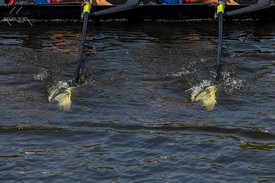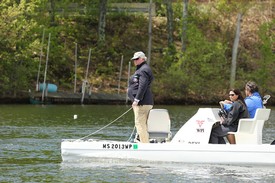FISA's Hard Look at Rowing's Future
Changes in the Olympics and World Championships program are virtually assured
Oli Rosenbladt, row2k.com

On the heels of FISA's release of the summary of the recent "National Federations Conferences" on March 6 in London, folks in the rowing world zeroed in on the most visible "pillar" in FISA's strategic direction, which is to "retain a strong position in the Olympic Movement." As evidenced by the strong reactions it elicited, this innocuous phrase hits way above its weight class (so to speak), and definitely telegraphs the fact that keeping rowing intact as an Olympic sport is likely to involve some pretty serious changes.
"An important factor in retaining a strong position in the Olympic Movement is the alignment of FISA's strategy with the 40 Olympic Agenda 2020 recommendations that were adopted by the International Olympic Committee (IOC) in December 2014," stated the FISA release, and without running down the full 40 recommendations from IOC's Agenda 2020 (you can find the full IOC document here) and their potential impacts on rowing, it's clear that FISA and the rowing world at large are going to need to stomach bigger changes in the coming years.
The crux is this: the Olympics are moving away from a sports-based program to an events-based program, which will cap the number of events across the entire Olympics. Additionally, the IOC has adopted a gender equality mandate that all Olympic sports have exactly 50% male/50% female participation; Olympic rowing currently stands at 60% male/40% female.
With rowing's position as one of the founding Olympic sports, as well as our own (occasionally well-founded) perception within the sport that rowing is being squeezed, the discussion about adding & subtracting Olympics events is likely to be contentious and even brutal - as mentioned above, in some quarters, it already is.
Olympic Changes
Roughly speaking, FISA has identified three potential changes to the Olympic events schedule to accomplish this tightrope walk of balancing boats and bodies:
- Proposal 1: Add W4- (13 entries) remove LM4-, reduce LM2x to 18 entries (from 20), expand W4x to 10 entries (from 7), reduce LW2x to 18 entries (also from 20)
- Proposal 2: Add LM1x and LW1x (34 entries each), remove LM4- and M4-, expand W1x and M1x to 34 entries each (from 32), expand M4x and W4x to 13 entries (from 7)
- Proposal 3: Add W4- (7 entries), LM1x and LW1x (34 entries each), remove LM4-, M2x and W2x, expand M4x and W4x to 13 entries (from 7)
Each of these proposals leads to identical numbers of women's and men's entries, athletes, and crews in the regatta.
In short, the LM4- seems doomed after appearing in six Olympiads; scullers have reason to be optimistic; and the bumping of some entry numbers and/or addition of the Light Singles would seem to open the Olympic regatta to countries that might not ordinarily qualify for the Olympics in rowing.
Additionally, a proposal also discussed at the London meeting involves limiting the amount of crews any given country could qualify for the Olympics in a given year, with caps of 10 or 12 events being discussed.
To put it bluntly, there is seemingly no amount of juggling the numbers that would accomplish the IOC-mandated 50/50 balance between men and women, either in terms of events or athletes, without even iconic and cherished events like the M4- or the LM4- being considered for the axe.

World Championships Changes
Of course, changing the Olympic program would also have ramifications for the World Championships (Senior, Junior, U23 and Adaptive). Conceivably we could see further events fall out of international competition (as the Men's Lightweight 8+ did this past fall), and possibly at an accelerated rate, as FISA is considering removing BOTH the given men's and women's events if an event should be subject to FISA's "natural death" rule for event removal. In other words, we could see a situation where the lightweight men's quad falls below the removal threshold, which would then lead to the removal of the Men's AND the Women's Lightweight Quad events from the WCH program.
As with the changes to the Olympic program, FISA has provided potential changes for the World Championships program; while we won't go into the details here, the full list of changes can be found in the FISA document here. As a departure from past event-by-event discussions (which could be seen as favoring certain countries or constituencies), FISA has proposed that voting for the Worlds programs be achieved via "a complete block vote on all WCH boat classes, not individual boats."
Beyond events, the conference addressed tweaks in sponsorship and advertising rules, posited entry caps and/or qualification requirements for World Championships, proposed changes to the progressions, considered changing the course distance to accommodate shorter/smaller bodies of water, eliminating averaging for lightweights, and discussed lengthening the adaptive racing at Worlds to the same length as the able-bodied athletes to reduce the logistical challenge of running two race distances at the same regatta.

What Does It All Mean?
All of this is heavy duty, for sure, and if you are a coxswain or a lightweight, these proposals can be a sobering read. To be fair, at this stage all of these changes are being discussed as proposals, and FISA has made it clear that they will solicit input from all FISA member nations, which number 148 as of 2015.
The timeline for making these decisions is this: the IOC will finalize events for the Tokyo 2020 Olympics in the fall of 2017. All Olympic sports federations, including FISA, will be required to submit their (fully Agenda 2020 compliant) plan for the 2020 Olympics at that time. To meet the IOC's deadline, the final discussions and votes to adopt the changes to Olympic rowing and the World Championships programs will occur at the FISA Extraordinary Congress in February, 2017, or eleven months from now.
Beyond the lamentations over lost events and changes to rowing's position in the Olympics, which are without a doubt rowing's global showcase, it's worth noting that in an age where more and more of what sports actually do is dictated by money, access (to venues, athletes, markets, and otherwise), and "optics," this is a conversation rowing will not be able to avoid.
Rowing is an expensive sport, globally limited in scope and cachet compared to some other sports, and, as we all know, has a spectator problem--consider that, over the eight days of the World Championships in Aiguebelette last summer, a grand total of 35,500 people came out to see the best rowers in the world do their thing – and a large number of them watched the racing on the jumbotrons away from the water.
By contrast, that figure is only about 30% of the 108,975 people who went to Buckeye stadium on November 21st this past fall to watch the Ohio State - Michigan State football game; that's about as stark as those numbers get. Rowing has plenty of room to grow. Determining the direction of that growth, however, will not be easy.
If you enjoy and rely on row2k, we need your help to be able to keep doing all this. Though row2k sometimes looks like a big, outside-funded operation, it mainly runs on enthusiasm and grit. Help us keep it coming, thank you! Learn more.
Comments | Log in to comment |
- Bont Rowing
- Calm Waters Rowing
- Concept 2
- Craftsbury Sculling
- The Crew Classic
- CrewLAB
- Croker
- Dad Vail Regatta
- Durham Boat Co.
- Empacher
- Faster Masters
- Filippi
- Fluidesign
- h2row.net
- HUDSON
- Live2Row Studios
- Nielsen-Kellerman
- Oak Ridge RA
- Peinert Boat Works
- Pocock Racing Shells
- Race1 USA
- Rockland Rowing Masters Regatta
- RowKraft
- Rubini Jewelers
- Vespoli USA
- WinTech Racing
- Bont Rowing
- Calm Waters Rowing
- Concept 2
- Craftsbury Sculling
- The Crew Classic
- CrewLAB
- Croker
- Dad Vail Regatta
- Durham Boat Co.
- Empacher
- Faster Masters
- Filippi
- Fluidesign
- h2row.net
- HUDSON
- Live2Row Studios
- Nielsen-Kellerman
- Oak Ridge RA
- Peinert Boat Works
- Pocock Racing Shells
- Race1 USA
- Rockland Rowing Masters Regatta
- RowKraft
- Rubini Jewelers
- Vespoli USA
- WinTech Racing

















03/17/2016 9:35:29 PM
03/12/2016 10:19:30 PM
A survey has been started to canvas views about which events should be in the Olympics and which should not. The survey includes the option for you to state an alternative to the three FISA proposals above.
I suspect this has come out of that stronghold of lightweight mens rowing, Denmark. Help them by sharing the link. https://surveyplanet.com/56e1b670493d480c1bf1192d
03/12/2016 4:41:29 PM
03/11/2016 3:50:45 PM
03/17/2016 9:40:11 PM
03/10/2016 11:57:58 AM
03/11/2016 10:50:53 AM